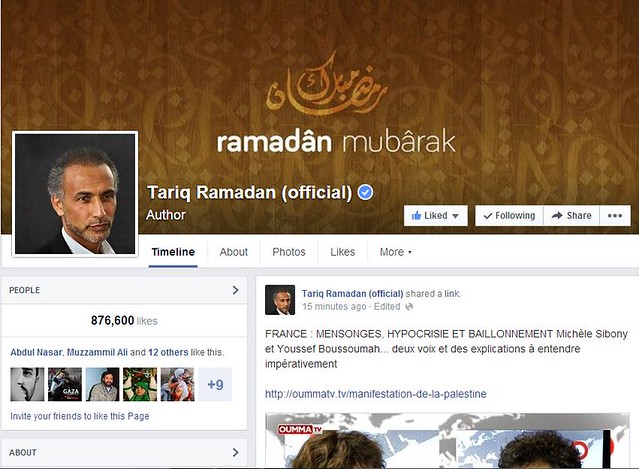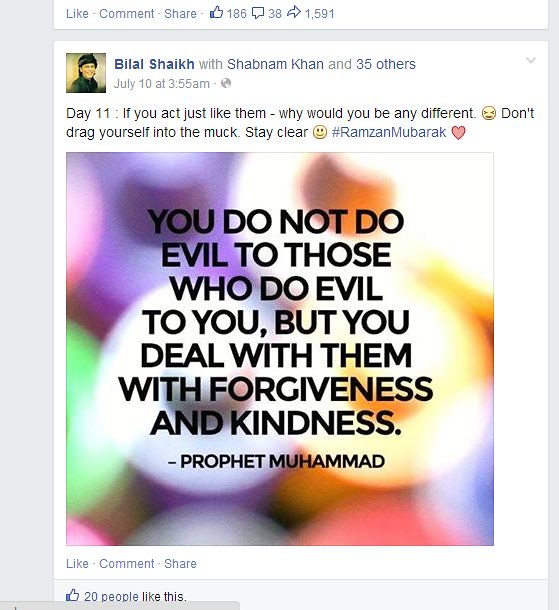By Mohammed Abdul Jawad,
O, what a blessed month is this! Yea, of course, I mean ‘Ramadan’—the month of sublime patience, repentance, forgiveness and generous spending. It carries its unique beauty, virtues and rewards. We ought to know the reality of fasting, the acts of worship, the manners of supplications, the essence of piety, the ways to achieve steadfastness and protection from deviations, the etiquettes of night prayer, the virtues of Laylatul Qadr (Night of Revelation) and the significance of charity.
But, the lives of modern Muslims are typically strange. Now-a-days, Muslims find it much easier to learn religion through social networking and smart phones applications. You don’t need a tutor, at all. All you need is to get hooked up to Twitter and Facebook, and then, there’s flow of info that keep coming. Under the tutelage of instant communication and personalized mobile technologies, every person has turned himself like a reporter, conveying around the messages he has received from others. Who cares to think about: What’s the authenticity of the information? Is it abridged or rewritten, with some changes? Does the info carry any source or citation?

It’s totally distractive and insensible when people spend too much time on Facebook and Twitter during Ramadan instead of spending their valuable time on worship, recitation and understanding of Qur’an or other righteous deeds. You shouldn’t believe anything that you may receive in the form of news, images, video or audio clips via Twitter, Facebook or WhatsApp without checking the credibility of source.
Recently, in news, Ali Al Ahmad, Chief Corporate Communication Officer at Etisalat commented, “Saudi Arabia is the second fastest growing country on Twitter and the Arabic language is the fastest language on the social media platform. Four to five million tweets coming from the Arab world are from Saudi Arabia and the next in line is the UAE with 400,000 tweets. Statistics also found that 80 per cent of twitter users are below the age of 25,” said Ali Al Ahmad, Chief Corporate Communication Officer at Etisalat.
Muslims, in the past, would study the Quran by taking few verses of Quran at a time only. Then, they would study these few verses, with utmost sincerity. They would memorize those verses and apply its rulings to their lives. They would not move onto the next few verses until they had brought their lives into compliance with the first few verses. Thus, the Quran became alive and second nature to them, its knowledge was not wasted and not lost.

But, in present times, we see that Twitter has inspired many with the idea of sending a chosen verse from the Quran each day to their network of friends. It’s like just reading, and moving onto the next. No serious pondering, no interpretations, no explanatory notes. It’s just fast paced reading and learning through tweets, themes, topics, links, hashtags and info postings. With information overload, one forgets everything the next day.
According to Twitter research, Ramadan has emerged as an important period for social media, with users sending more than 74.2 million tweets about Ramadan from around the world in 2013. Definitely, this year, there must be more users online and must be passionate to engage themselves. In fact, judging by findings in the latest Arab Social Media Report, the trend is only going to soar. As of May 2014, there were 81,302,064 Facebook users in the Arab world (up from 54,552,875 in May 2013), and the total number of active Twitter users reached 5,797,500 users as of March 2014.
Of course, there’s a possibility of users becoming afflicted with addiction, it seems that they cannot bear to be without it, and this is something apparent. While the essence and virtues of Ramadan is on one side, and on the contrary, Muslims are so fascinated by Twitter and Facebook that they portray Ramadan according to their whims and observances, and keep themselves engaged using Ramadan tie-in applications. It seems that the virtual and high-tech worlds has transformed Ramadan, the month of self-control and perseverance into interactive event and Ramadan festivals, and the Muslims young and old have become addicted broadcasters and campaigners.

And then, what a miserable state when social media, at extremes, lends itself to gossiping and vain talk! People become so glued to their devices all the time to the extent that they don’t talk to the one next to them or their families or to their children in their houses. Rather they enjoy being engaged online on those sites.
To sum up, let us avoid these sites from the beginning, and we will be safe if we adopt the idea of abstaining ourselves from our digital and consumerist addictions.
Link:
Ramadan 1435: TCN series

